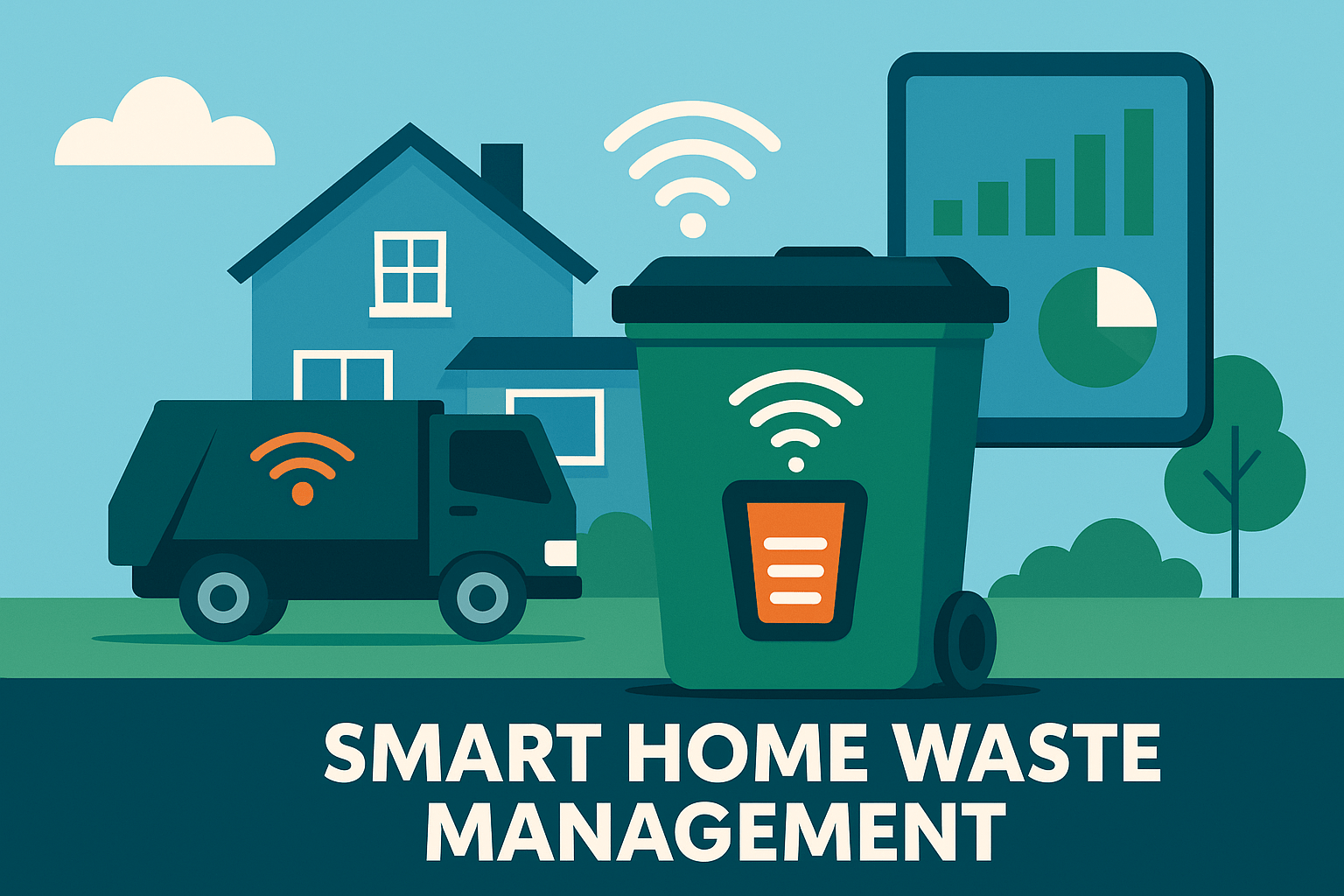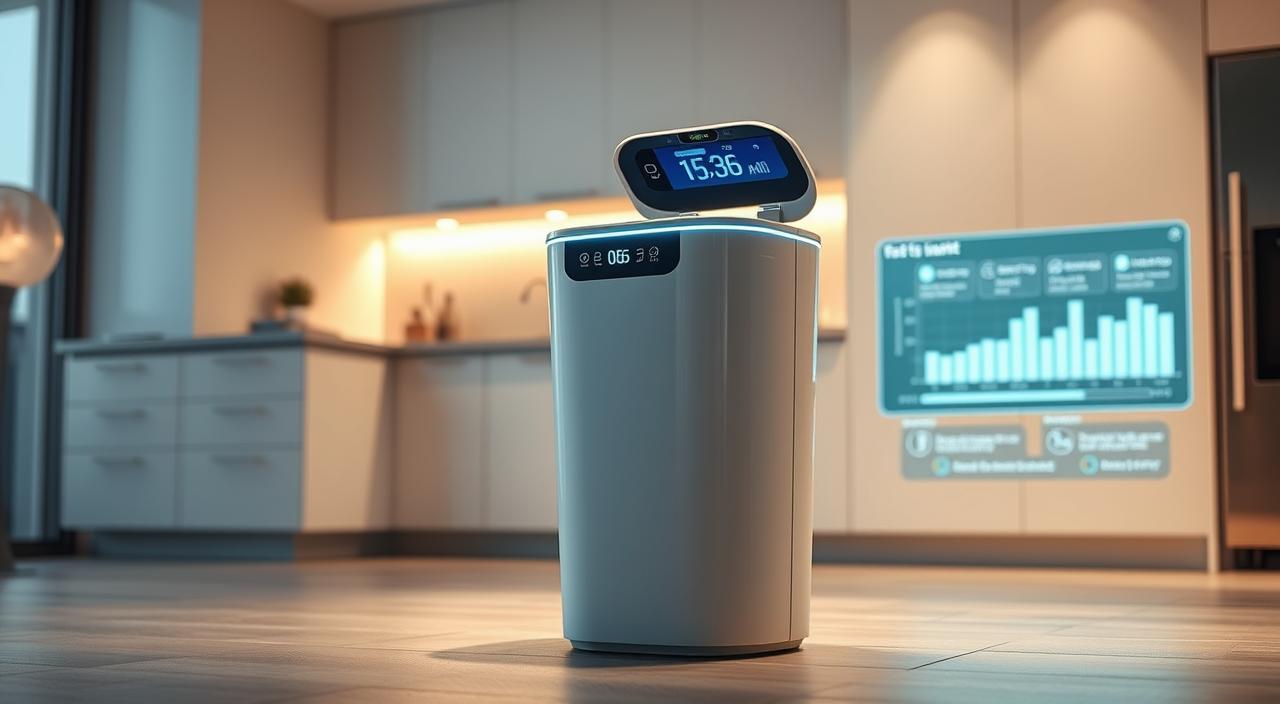
Imagine a future where your household bin notifies your council when it’s full, and collections only happen when truly needed. This is not a vision for tomorrow—it’s the smart home waste management revolution already reshaping British communities today. With over 2 billion tonnes of municipal waste generated globally each year, traditional disposal systems are outdated, inefficient, and environmentally costly.

In this long-form guide, we explore how intelligent technologies—ranging from IoT-connected bins to AI-driven recycling sorters—are changing how UK homes handle waste. These innovations aim to reduce overflow, cut carbon emissions, and improve overall sustainability.
Key Takeaways
- IoT-enabled bins optimise waste collection and reduce unnecessary trips
- Predictive analytics cut disposal costs for households and councils
- AI sorting technologies improve recycling accuracy at home
- Real-time data sharing helps councils manage routes and resources
- Smart home waste management supports the UK’s net-zero goals
The Rise of Intelligent Waste Management
Traditional household waste systems rely on fixed collection schedules, regardless of whether bins are full or nearly empty. This results in inefficient routes, increased emissions, and avoidable costs.
Smart waste management shifts this paradigm. Internet-connected devices monitor bin fill levels, analyse disposal habits, and generate insights that enable real-time decisions. This technology is already proving effective in trials across the UK.
Why Old Methods No Longer Work
- 80% of collections are mistimed, causing wasted trips and overflowing bins
- Fixed schedules create inefficiencies—lorries may drive routes for half-full bins
- Operational costs rise due to fuel waste and repeated stops
How Smart Home Waste Management Improves Daily Routines

Smart bins equipped with fill-level sensors, temperature gauges, and even odour detection are now available for domestic use. These bins provide instant updates to local authorities or private collectors, improving the collection process and reducing environmental impact.
| Smart Bin Features | Benefits to Homeowners and Councils |
|---|---|
| Fill-level sensors | Avoids overflowing or underused bins |
| AI-powered material detection | Enhances recycling accuracy |
| Integrated compactors | Increases space by compressing waste |
| Decomposition tracking | Identifies organic waste before it rots |
| Real-time alerts | Ensures timely collection and fewer complaints |
Using Predictive Analytics in Smart Waste Disposal
Using AI-powered data analysis, waste systems can forecast when a bin is likely to be full. This transforms the process from reactive to proactive, ensuring collections are aligned with actual need.
Example in Action During summer festivals in Bristol, sensors alerted authorities to increased bin use near parks, triggering additional pickups. In Hampshire, smart routing reduced lorry mileage by 19% within six months.
Benefits of Predictive Waste Management
- Cuts council costs by up to 30%
- Reduces emissions through fewer vehicle trips
- Enhances service satisfaction with fewer missed collections
- Identifies waste trends for better education campaigns
Dynamic Routing and Real-Time Coordination
Traditional routes don’t adapt to day-to-day changes. In contrast, smart systems adjust in real time—rerouting based on traffic, weather, or special events. This dynamic approach means resources are used only where needed.
| Traditional Waste Collection | Smart Waste Collection |
|---|---|
| Fixed weekly routes | Dynamic, data-driven routing |
| Unnecessary trips | Only collect when bins are full |
| Manual driver scheduling | Automated, optimised dispatching |
| High fuel consumption | Reduced emissions and operating costs |
Leeds and Manchester councils are already leveraging these systems, reporting monthly savings of over £18,000 per route while significantly improving service quality.
AI Technology Revolutionising Smart Recycling at Home

AI is becoming a vital part of the recycling chain, not just in processing plants but even within homes.
Smart Sorting Technology
- Bin-e: A smart bin that identifies and separates plastics, metals, and paper using AI vision systems
- AMP Robotics: Uses neural networks to recognise waste items and sort at triple the speed of human workers
- Sensor-driven robotic arms: Separate contaminated materials to prevent entire loads from being rejected
These innovations dramatically reduce contamination and increase recovery rates—by as much as 22% in pilot trials.
Real-World Environmental Impact
Reducing lorry mileage and improving collection timing not only saves money—it significantly cuts greenhouse gas emissions. Local trials have seen:
- 40% reduction in waste vehicle mileage
- 12,000 fewer miles driven per month (Leeds trial)
- 44% drop in fly-tipping reports (Manchester)
- 61% reduction in rodent complaints in monitored neighbourhoods
Smart systems are helping cities meet environmental targets while improving public health and sanitation.
Economic and Community Benefits of Smart Waste Systems
Smart home waste systems benefit more than just the environment—they create a better everyday experience for families and councils alike.
- Lower Household Bills: Families reduce their waste-related costs through better recycling and fewer overcharges
- Cleaner Streets: On-demand pickups keep bins from overflowing
- Fewer Missed Collections: Alerts ensure bins are serviced when necessary
- Council Efficiency: Funds saved are reinvested in composting sites or educational campaigns
For those embracing sustainable practices, eco-friendly house clearance solutions are now being integrated with digital tracking tools to optimise waste management at home.
Planning for a Circular Economy
Smart waste solutions play a key role in supporting the UK’s broader circular economy goals. These technologies allow every home to participate in reducing, reusing, and recycling more effectively.
Upcoming Innovations
- Self-sorting bins that communicate directly with recycling plants
- Blockchain-based tracking of household waste sources
- Integration with smart kitchen devices to reduce food waste before disposal
By embracing data, automation, and AI, UK councils and households are co-creating a future where waste is not a burden—but a resource.
Conclusion
Smart home waste management is no longer an idea for the future—it’s the present reality transforming how British households handle everyday rubbish. With connected devices, predictive analytics, and AI-powered recycling, the way we dispose of waste is smarter, cleaner, and more efficient than ever before.
This revolution isn’t just about convenience—it’s about environmental responsibility, reduced emissions, and building a circular economy that works for everyone. From lower bills to cleaner neighbourhoods, the benefits are tangible.
By adopting these smart systems now, residents and councils alike can create a sustainable future—one bin at a time.

 CALL NOW
CALL NOW